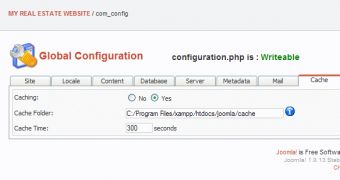When you are using the Joomla content management system, the overall site performance could be affected by various factors. Moreover, if you have many site users, the page loading speed could be influenced by the simultaneous number of MySQL database queries. In order to obtain the best results for the page loading speed (which is a key factor for the search engines rankings) and to maintain the best performance of your Joomla website, there are a few tips that could help you.
The recent studies show that Joomla is twice as fast when used with PHP 5.2.3 in comparison with PHP 4.4, as a consequence the use of the last PHP version (which is definitely improved) will always offer you the optimal Joomla performance.
If you turn on caching on the Cache tab from Joomla Global Configuration in Administration Panel, then static files or a cache of your website will be created. The file caching allows the system to find a certain page directly from hard disk and removes the delay induced by a MySQL query to retrieve the same page in the database. The speed of page loading will also be increased by enabling caching.
On the Cache tab, when enabling caching, you must not modify the default cache folder, but you can set a lower value for the cache time if you update the site contents often and a higher value if the content is changed rarely. There are also many modules from Joomla structure that support caching. It is recommended to enable caching for those modules. There are also components that improve the page caching process, such as Ircmaxell's Page Cache.This component will have visible effects on page load speed in case of website with high traffic.
Another important aspect that could affect Joomla performance is the template structure. For the best performance, you should use CSS templates and remove the unused CSS styles. The images should be optimized for web display in order to decrease the page loading time. The unused modules should be unpublished and flash modules should be avoided if they are not really necessary.
Before installing Joomla on a webserver you should test the site performance using benckmarking tools on the local computer. There are more advanced settings to modify in php.ini and .htaccess files, respectively, to increase Joomla performance, but these are specific to every joomla website, depending on its destination. In case you modify them, you should check the apache server documentation to maintain your website free of errors.

 14 DAY TRIAL //
14 DAY TRIAL //